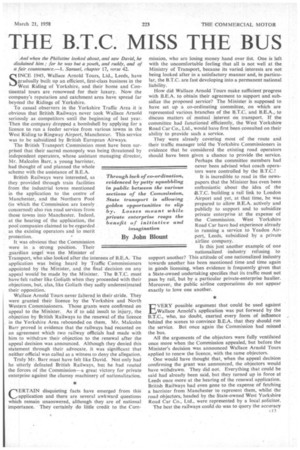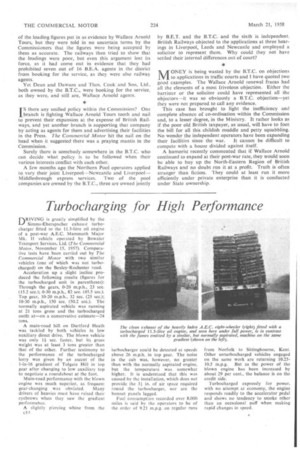THE B.T.C. MISS THE BUS
Page 49

Page 50

If you've noticed an error in this article please click here to report it so we can fix it.
And when the Philistine looked about, and saw David, he disdained him ; for he was but a youth, and ruddy, and of a fair countenance,--1. Samuel, chapter 17, verse 42.
SINCE 1945, Wallace Arnold Tours, Ltd., Leeds, have gradually built up an efficient, first-class business in the West Riding of Yorkshire, and their home and Continental tours are renowned for their luxury. Now the company's reputation and catchment area have spread far beyond the Ridings of Yorkshire.
To casual observers in the Yorkshire Traffic Area it is obvious that British Railways never took Wallace Arnold seriously as competitors until the beginning of last year. Then the company dropped a bombshell by applying for a licence to run a feeder service from various towns in the West Riding to Ringway Airport, Manchester. This service was to be subsidized by British European Airways.
The British Transport Commission must have been surprised that their sacred monopoly was being threatened by independent operators, whose assistant managing director, Mr. Malcolm Barr, a young barrister, had thought of and planned the whole scheme with the assistance of B.E.A.
British Railways were interested, as they provided through train facilities from the industrial towns mentioned in the application to the centre of Manchester, and the Northern Pool (in which the Commission are keenly concerned) also ran road services from those towns into Manchester. Indeed, at the hearing of the application, the pool companies claimed to be regarded as the existing operators and to merit protection. o It was obvious that the Commission were in a strong position. Their guardian angel was the Minister of Transport, who also looked after the interests of B.E.A. The application was being heard by Traffic Commissioners appointed by the Minister, and the final decision on any appeal would be made by the Minister. The H.T.C. must have felt rather like Goliath when they proceeded with their objections, but, alas, like Goliath they sadly underestimated their opposition. '
Wallace Arnold Tours never faltered in their stride. They were granted their licence by the Yorkshire and North Western Commissioners. Those grants were confirmed on appeal to the Minister. As if to add insult to injury, the objection by British -Railways to the renewal of the licence in the Yorkshire Area rebounded on them. Mr. Malcolm Barr proved in evidence that the railways had recanted on an agreement which two railway officials had made with him to withdraw their objection to the renewal after the appeal decision was announced. Although they denied this statement through their advocate, it was significant that neither official was called as a witness to deny the allegation.
Truly Mr. Barr must have felt like David. Not only had he utterly defeated British Railways, but he had routed the forces of the Commission—a great victory for private enterprise against the clumsy machinery of nationalization.
CERTAIN disquieting facts have emerged from this application and there are several awkward questions which remain unanswered, although they are of national importance. They certainly do little credit to the Com
mission, who are losing money hand over list. One is left with the uncomfortable feeling that all is not well at the Ministry of Transport, because its varied interests are not being looked after in a satisfactory manner and, in particular, the B.T.C. are fast developing into a permanent national liability.
How did Wallace Arnold Tours make sufficient progress with B.E.A. to obtain their agreement to support and subsidize the proposed service? The Minister is supposed to have set up a co-ordinating committee, on which are represented various branches of the B.T.C. and B.E.A., to discuss matters of mutual interest on transport. If the committee had functioned efficiently, the West Yorkshire Road Car Co., Ltd., would have first been consulted on their ability to provide such a service. They were already covering most of the route and their traffic manager told the Yorkshire Commissioners in evidence that he considered the existing road operators should have been given a chance to provide the service. Perhaps the committee members had never been advised what coach operators were controlled by the B.T.C.!
It is incredible to read in the newspapers that the Minister has even been enthusiastic about the idea of the ,B.T.C. building a rail link to London Airport and yet, at that time, he was prepared to aliow B.E.A. actively and publicly to support and to subsidize private enterprise at the expense of the Commission. West Yorkshire Road Car have had experience already in running a service to Yeadon Airport, Leeds, subsidized by a private airline company.
Is this just another example of one nationalized industry refusing to support another? This attitude of one nationalized industry towards another has been mentioned time and time again in goods licensing, when evidence is frequently given that a State-owned undertaking specifies that its traffic must not pass by rail, but by a particular private-enterprise haulier. Moreover, the public airline corporations do not appear exactly to love one another.
EVERY possible argument that could be used against Wallace Arnold's application was put forward by the B.T.C., who, no doubt, exerted every form of influence behind the scenes to convince B.E.A. that they should run the service. But once again the Commission had missed the bus.
All the arguments of the objectors were fully ventilated once more when the Commission appealed, but before the Minister's decision was announced Wallace Arnold Tours applied to renew the licence, with the same objectors. One would have thought that, when the appeal decision confirming the grant was announced, the objectors would have withdrawn. They did not_ Everything that could be said had already been said, but they turned up in force at Leeds once more at the hearing of the renewal application. British RailWays had even gone to the expense of fetching a barrister from Manchester to represent them, whilst the road objectors, headed by the State-owned West Yorkshire Road Car Co., Ltd., were represented by a local solicitor.
The best the railways could do was to query the accuracy of the loading figures put in as evidence by Wallace Arnold Tours, but they were told in no uncertain terms by the Commissioners that the figures were being accepted by them as accurate. The railways then tried to show that the loadings were poor, but even this argument lost its force, as it had come out in evidence that they had prohibited seven out of 16 B.E.A. agents in the district from booking for the service, as they were also railway agents.
Yet Dean and Dawson and Thos. Cook and Son, Ltd., both owned by the B.T.C., were booking for the service, as they were, and still are, Wallace Arnold agents.
ys there any unified policy within the Commission? One ibranch is fighting Wallace Arnold Tours tooth and nail to prevent their expansion at the expense of British Railways, and yet another branch is supporting that company by acting as agents for them and advertising their facilities in the Press. The Commercial Motor hit the nail on the head when it suggested' there was a praying mantis in the Commission.
Surely there is somebody somewhere in the B.T.C. who can decide what policy is to be followed when their various interests conflict with each other.
A few months ago the Northern Pool operators applied to vary their joint Liverpool—Newcastle and Liverpool— Middlesbrough express services. Two of the pool companies are owned by the B.T.C., three are owned jointly by B.E.T. and the B.T.C. and the sixth is independent British Railways objected to the applications at three hearings in Liverpool, Leeds and Newcastle and employed a solicitor to represent them. Why could they not have settled their internal differences out of court?
MONEY is being wasted by the B.T.C. on objections to applications in traffic courts and I have quoted two good examples. The Wallace Arnold renewal fracas had all the elements of a most frivolous objection. Either the barrister or the solicitor could have represented all the objectors—it was so obviously a B.T.C. objection—yet they were not prepared to call any evidence.
This case has brought to light the inefficiency and complete absence of co-ordination within the Commission and, to a lesser degree, in the Ministry. It rather looks as if the poor old British taxpayer, as usual, will have to foot the bill for all this childish muddle and petty squabbling. No wonder the independent operators have been expanding
their facilities since the war. It cannot be difficult •to compete with a house divided against itself.
A humorist recently commented that if Wallace Arnold continued to expand at their post-war rate, they would soon be able to buy up the North-Eastern Region of British Railways and no doubt run it at a profit. Truth is often stranger than fiction. They could at least run it more efficiently under private enterprise than it is conducted under State ownership.








































































































